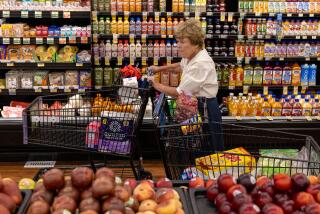Grocery Express: It Brings Home the Bacon for a Price
- Share via
SAN FRANCISCO — A plain green building in the city’s produce district looks like a warehouse and, like a warehouse, is filled with row after row of boxes and cans. But Mary Garvey sees it differently.
“This is a laboratory,” she said. “We’re creating a new industry.”
Garvey, 31, is president of Grocery Express, a company that delivers just about anything you can find on a supermarket shelf to people who can’t or don’t want to shop and are glad to pay a little extra for convenience.
Garvey is betting hours and dollars she’s lost count of that the number of those people will keep growing, continuing to pull the 7-year-old company out of the red and allowing it to expand beyond San Francisco.
‘People Have Less Time’
“Every day and in every way, people have less and less time. And that trend is not reversing,” she said in a recent interview.
About 5,000 people in the city and the northern San Francisco Peninsula save time by ordering at least some of their groceries from Garvey’s company and having them delivered for a flat fee of $4.25. Prices are about 15% higher than a large supermarket’s and about the same as a corner store’s, Garvey said.
Forty percent of her patrons are businesses, elderly residents and homebound people, but the rest are two-income couples, professional singles or families with young children.
“These are people who have no time but lots of demands on their time. And they need food,” she said.
‘Great Thing’
Katherine Craven, a writer and homemaker, first called Grocery Express 6 1/2 years ago, when she was pregnant with her daughter. She quailed at the thought of climbing stairs to her second-floor Victorian flat with bags of groceries.
“For me it’s been a great thing, and particularly in the winter or if someone is sick, it’s just a godsend,” said Craven, who buys up to 80% of her groceries from Grocery Express during the winter and 25% to 50% during the summer.
Craven and other customers order from among several hundred items in Grocery Express’s catalogue, a 128-page guide that includes fresh flowers, restaurant meals and food gift baskets, as well as fresh meat and produce and canned and packaged goods.
Each item has a number, which Grocery Express clerks punch into a computer, noting whether customers want their chicken boned or bananas barely ripe. Customers can also file orders through home computers.
Orders are put together in the 18,000-square-foot warehouse and delivered in one of seven vans at prearranged times.
“They rarely mess up an order,” Craven said. “If they do--for instance, if the carrots aren’t really that fresh--I call them, and they either pick them up . . . or drop the charge.”
Grocery delivery, while not a new idea, hasn’t been a very profitable one. Over the last 15 years, other entrepreneurs have started companies like Grocery Express but have failed, Garvey said.
Grocery Express nearly became one of those failures after an enthusiastic beginning that stemmed from the urge to start a business--”any business,” she recalled.
“Groceries seemed so logical. People were saying they were spending four, five, seven hours a week in the grocery store,” said Garvey, who herself dislikes shopping.
Although Garvey was an original investor, it was her former husband, Michael Meagher, and friend John Coghlan who were the real founders, she said. But Garvey became more involved in Grocery Express, becoming a director in 1983 and taking over the company two years later.
Grocery Express sales in 1984 had leveled at about $2 million, and the company wasn’t making money. The company raised prices but lost customers and more money. In 1985, the founders considered shutting down.
But Garvey, who describes herself as “eternally optimistic,” was sure she could turn the ailing business around.
“I was just certain this is a business people need,” she said. “I looked at it from a different point of view--long term--and was willing to spend the additional time and money.”
Garvey, who has an economics degree from Stanford University, absorbed business from her family’s company, Garvey Industries., a Wichita, Kan.-based company involved in oil and gas, grain and real estate.
Since 1985, Garvey has put between $1.5 million and $2 million into the company, reduced prices and used direct mail and radio ads to regain former patrons and win new ones.
In 1986, sales rose to $2.3 million with losses of $330,000, and last year, sales rose to $2.7 million with losses of only $75,000.
Grocery Express now employs about 40 people and receives about 120 orders a day, an increase of about 10% over 1987, and Garvey is expecting a profit this year.
“It takes us a while to get a customer to try us in the first place because people have a lot of misconceptions--’Oh, it can’t be as good as what I pick out for myself.’ But once we break down their resistance and get them to try us, we’ve got them,” she said.
But Garvey quickly added that she knows her recovering business can’t afford to be complacent. She is preparing for a fall push throughout the San Francisco Bay Area and plans to expand the delivery area farther down the peninsula and to the East Bay and Marin County. She is also considering opening another warehouse.
“It’s going to be interesting to see,” she said of her company’s future. “I think we will meet it with flying colors.”
More to Read
Inside the business of entertainment
The Wide Shot brings you news, analysis and insights on everything from streaming wars to production — and what it all means for the future.
You may occasionally receive promotional content from the Los Angeles Times.










